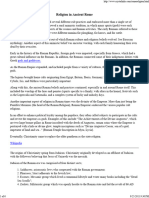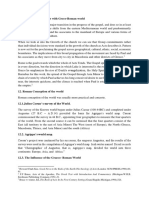Podcast Script
Hello and welcome to the Religious Politics and the Politics of Religion in Ancient
Rome. My name is Nathan Loutsis and today we will be discussing how religion in
ancient Rome played a major role in the development and appeals of cults of
personality.
[audio intro]
As we look at the rise of cults of personality we will first address the prevalence and
crucial role of religion in Roman politics and society; from the cursus honorum
establishing religious offices as political stepping stones-- to the importance of omens in
political processes. Next, we will demonstrate the utilization and appeal of these
positions to men who gained cults of personality, and their aspirations to become like
‘gods among men.’ Cults of personality in ancient Rome evolved to act more like actual
religions than just political partisanship, as most emphasized with the case of Julius
Caesar, and the politicians who led them relied on their individual religious/political
offices to achieve such status.
Today’s podcast will draw upon Edward Watts’s Mortal Republic, Livy’s History of Rome,
Thomas Martin’s Ancient Rome, Mary Beard’s documentaries Empire Without Limit:
Prisoners and Slaves and Julius Caesar, Andrew Wallace-Hadrill’s Augustan Rome,
Suetonius’s the Deified Caesar, Miriam Griffin’s Companion to Julius Caesar, and
University of Washington Professor Michael Ritter’s lectures from his course on the
appeal of authoritarianism in ancient Rome.
In this first section, we will discuss the context and prevalence of religion in ancient
Rome. So, let’s dive back in time to the beginnings of the Roman Republic…
As Beard tells us, the Romans believed that their empire was founded by the twin
brothers Remus and Romulus, descendants of Aeneas, a god portrayed in the Illiad.
�Aeneas was adopted into Roman mythology through the Roman poet Virgil’s Aeneid,
which established a link between Rome’s founders and the gods as an accepted history
among the people. Martin goes on to explain that the City of Rome was founded in 753
BC by Romulus after he murdered his brother Remus. Romulus’s mysterious
disappearance in 716 BC led much of the population to believe he had returned to the
sky, immortal. This common myth believed to be true by the citizens of Rome shows just
how greatly religious mythology played into the Roman’s understanding of their own
civilization’s history.
Six more kings were to succeed Romulus, with religion playing an influential role in their
rule. Such an example can be noted in Livy’s account of the last King, Lucius Tarquinius
Superbus, who relied on omens from the birds and consultations with the oracle of
Apollo at Delphi to justify and influence the construction of temples towards the end of
his reign. He was eventually dethroned, says Martin, along with monarchy altogether in
509 BC. Thus, the Roman Republic was born.
The reliance on omens and other perceived divine revelations continued well throughout
the time of the Republic, such as when Julius Caesar was consul. Professor Ritter
points out that Caesar’s fellow consul Bibulus would claim adverse omens, which would
essentially suspend Roman government business for the day, highlighting just how
much influence religion had on the daily operations of the Roman government.
Beyond just a level of influence, the Roman government and religion were essentially
the same thing. Rome was governed by a “Roman Constitution,” or the combination of a
hierarchy of political offices and voting assemblies, says Martin. The latter of political
offices, called the cursus honorum, began with the low-level quaestors, then moved up
to tribunes, aediles, praetors, and eventually to consuls. Each had important political
power, but some had additional religious power.
Now, we turn to Professor Ritter to explain just how these elected positions were related
to state religion.
�[play The Birth of the Roman Republic 6:52-7:25]
As we can see from this, there was no separation between church and state, but a
combined political-religious state of government. From the mythical foundation of Rome
to its monarchical and Republican politics, religion played a tremendously influential and
primary role in the state.
In this next section, we will now discuss how this combination of religion and politics
was used by those seeking power and how it created an appeal of becoming god-like to
Roman leaders.
Many future leaders of cults of personality in the Roman Republic ascended the cursus
honorum to gain their power and influence by striving to reach the top. Some even used
their religious authority to consolidate their political power and hinder the climb of
others.
An excellent example of this occurred shortly after Caesar’s death when three men
were vying to assume his position. Marc Antony, one of these men and the co-consul
alongside Caesar, assumed the now vacant position of pontifex maximus, which was
the religious office of chief priest in the Republic and held authority over all adoptions.
Watts tells us that Marc Antony used this position to delay the adoption of his political
rival Octavian to the now-deceased Caesar. Although Octavian was to be adopted by
and become prime heir to Caesar through the conditions in his will, Antony was now
able to use his religious power to hold this off while he attempted to gain political
influence. This proved to be futile but just goes to show how religion was used for
political gain.
Not only did Roman leaders use religious offices to consolidate power against their
enemies, but they used it to legitimize their own causes. A Roman general or leader
who claimed to have the backing of the gods, as Octavian did in his struggle against
Antony a short while later, strengthened the resolve of his supporters and dissuaded the
�spirit of his opponents, says Wallace-Hadrill. Caesar did something similar himself. He
claimed to be a direct descendant from the gods. Suetonius says that in his eulogy of
his aunt Julia, Caesar stated that the Julii family traces their lineage to the goddess
Venus. This move granted him some level of legitimacy in his future endeavors and
began his pursuit to become a god among men.
Roman generals and politicians were constantly being driven to achieve greatness and
respect, or as they called it, dignitas, says Professor Ritter. As time went on, more and
more began to pursue a god-like status, inadvertently creating cults of personality in the
pursuit of their own ambitions. The first case of this occurred to the Roman general
Flaminius when he liberated Greece from Philip V and gave his Isthmian Proclamation.
Flaminius had been seeking dignitas in his Grecian excursions and was now revered as
a god among its people, states Professor Ritter. This scenario only became more
common among Romans as time progressed.
Besides being celebrated as a deity in foreign lands, the highest honor a general could
receive was to be celebrated as one back home. Many great generals equated
themselves to gods, putting their likenesses alongside them in temples, as Pompey did
in his temple of Venus, where he put a massive statue of himself holding the world, and
as Augustus did in the temple of Mars, positioning himself among a constellation of
gods, Professor Ritter reminds us. Now, the closest one could get to becoming a god
among the people, before Caesar, was to be granted a triumph, or a victory parade
displaying all of the wealth and prisoners that one had captured over the course of their
conquest. Many leaders of cults of personality received triumphs and pursued them in
their careers. Here, we turn to Beard to listen to what she says about Caesar’s triumph
and triumphs in general through her description of a painting of a triumphant Caesar.
[Julius Caesar 50:13-51:13]
Caesar exemplified the pursuit of dignitas to the status of becoming a god, as any
leader could only dream of. Watts says that immediately after his death, the citizens of
�Rome spontaneously erected altars to worship him and began sacrificing items of great
value, now treating him as a literal god.
This worship of him spread to the government. A statue was made of him with the title
of unconquered god, a law was passed acknowledging him as a state deity, he was
worshipped by his own approved cult: Divus Julius, he received his own priest and his
own state temple, Griffin says. He had reached the epitome of dignitas, of politics, of
religion. He was a god, loved by the people. This was the point all leaders of cults of
personality had attempted to achieve since Flaminius was first praised as a god by the
Greeks. Roman leaders after Caesar attempted to achieve the same level of following
and devotion from the people as he had. For instance, Augustus also achieved
deification similar to his predecessor, becoming Divus Augustus after his death, says
Wallace-Hadrill.
These leaders of Rome and founders of cults of personality were able to use state
religion to gain power and establish their legitimacy. This same religion also inspired
them to gather enough persuasion over the public and create a cult of personality, that
they would become immortal in the eyes of the people.
In today’s podcast, we have addressed the prevalence and crucial role of religion in
Roman politics and society, as seen in the structure of the Roman constitution and
reliance on divine messages. We have also looked at the utilization and appeal of these
positions to men who gained cults of personality, and their aspirations to become like
‘gods among men.’ These men were influenced by religion in their pursuit of power and
their end goals. Religion in ancient Rome led to the rise of the Republic’s cults of
personality as we know them. It had both a direct and indirect impact on them.
Thank you for tuning in to the Religious Politics and the Politics of Religion in Ancient
Rome. I’m your host Nathan Loutsis and I’ll see you next time.
[audio outro]




















































































